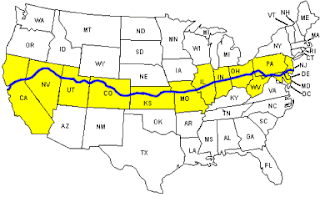House
Opinionated Ass
- Nov 1, 2012
- 3,310
- 719
- 190
It doesn't? "Under the Federal-Aid Highway Act of 1956, the government committed to pay for 90 percent of the cost of building 41,000 miles of interstate highways.", "A 1999 study, "Funding a Revolution: Government Support of for Computing Research," stated, "Federal funding not only financed development of most of the nation's early digital computers, but also has continued to enable breakthroughs in areas as wide ranging as computer time-sharing, the Internet, artificial intelligence, and virtual reality as the industry has matured." Among other things, the study details the now well-known role of the U.S. government in developing the ARPANET and the NSFNET for over three decades before it became available commercially as the Internet.", "Under the Pacific Railroad Acts of 1862 through 1866, the U.S. government handed railroad companies 103 million acres of public land that could be sold or used as loan collateral to finance the construction of transcontinental railroad lines.", "The 2010 budget of the National Institutes of Health (NIH) for life sciences research was30.9 billion, almost double in real terms the budget of 1993 and triple in real terms the budget of 1985. From the founding of the first national institute in 1938 through 2010, NIH spending totaled738 billion in 2010 dollars. The 2011 budget is30.9 billion, and the request for 2012 is32 billion. In addition, federal and state governments provide many subsidies to the medical field.", "One could go on to talk about the U.S. government's support for nanotechnology andrenewable energy, among other programs. None of these government programs is a secret. Indeed, prominent corporate executives lobby for them (and you won't find the Tea Party attacking them). Yet there is a widespread belief that the U.S. government plays at most a regulatory role in the economy.", yes actually IT DOES!
Again, you keep posting someone's opinion, as though, that makes it fact.
Renewable energy is a complete disaster. It's a massive fail. All it is, is government paying rich wealthy people, to make a product that doesn't solve any problem. Solar Panels require more electricity to make, than they ever produce in their entire life span. Wind Mills, do not replace any conventional source of power, while costing billions of dollars for very little energy.
The Federal Highway act, has lead to the creation of super expensive infrastructure that we can't afford to maintain.
Moreover, a ton of you people who keep referring to the interstate system....
I don't get you people. Are you blind? Look at this.

Right above the red dot, is I-70. Directly above I-70, is Route 40.
Before I-70, Route 40, went from NJ to CA.

In many many parts of Route 40, you can literally see I-70 from Route 40.
When I-70 was opened... I *KILLED* towns and businesses along Route 40, and the road is practically not used at all.

Miles on miles and see barely a handful of cars.
The point is, the Interstate didn't help anything. We already had a perfectly good 4-lane divided limited access highway, that stretched from coast to coast. Why did we need a second highway? We didn't. It was a waste of billions of tax dollars, for a road that wasn't needed, and in the process you killed towns and businesses along Route 40.
I can show you pictures of motels, shops and gas stations along Route 40, at least here in Ohio, but I bet elsewhere too, that are completely deserted.
See, this is what you people do. You push a bad policy, and build stuff we don't need. Then claim that without you and your program, we wouldn't be able to survive. No, you are wrong. Without I-70, we would have used the perfectly fine, perfectly function 4-lane divided limited access highway we already had.
Instead, you saddled us tax payers, with paying to keep and maintain a road we didn't need. Trucks and cars, could just as easily drive down Route 40 if they needed to get here.
And the truth is, nearly all Interstate Highways directly parallel existing roads. I-71 is paralleled by Route 62 and 22, or by Route 42. Ironically there are two large towns between Columbus and Cincinnati, I-71 manages to hit neither of them, while of course the State built roads hit one or the other. What a waste. I-75 is paralleled by Route 25. Route 20 is paralleled by I-90/80 from Buffalo New York, to Chicago.
Over and over, you people on the left, build a road, that parallels EXISTING ROADS.... and the come on here and say absolute crap like "Without us you wouldn't have roads!" or "It's because of OUR road, that we have economic benefit". Bull crap. Just crap! You are full of crap.
No, without you, I would not lose 20% of check to pay for roads we don't need.
Nicely detailed rant, but you're missing one important detail.
Interstate commerce
Roads like route 40 go through small towns and lack bypasses for large city centers. There are several reasons for interstates to exist.
- Safety: The more big rigs you have running through population centers, the more likely you are going to have accidents. As a truck driver, I try to stay away from state routes during the day because I don't like driving through school & hospital zones.
- Congestion: Those roads aren't meant to handle the kinds of traffic interstates are. You don't want 50 trucks in Nowheresville, USA when you're trying to drive 2 miles to get home from working at the local grocery.
- Fuel Economy: With commercial carriers being pressured to reduce emissions & fossil fuel usage, fuel economy is a major concern. Constant speed limit variations reduce fuel economy.
- Limited access highway is right: Limited access to truck stops, truck shops, and truck parking. 4-wheelers don't have to worry about these things, but they are daily necessities to truck drivers.
Last edited:

